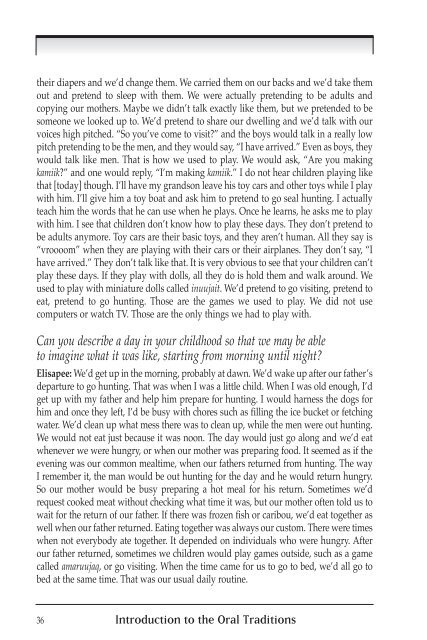Introduction-E
Introduction-E
Introduction-E
You also want an ePaper? Increase the reach of your titles
YUMPU automatically turns print PDFs into web optimized ePapers that Google loves.
their diapers and we’d change them. We carried them on our backs and we’d take them<br />
out and pretend to sleep with them. We were actually pretending to be adults and<br />
copying our mothers. Maybe we didn’t talk exactly like them, but we pretended to be<br />
someone we looked up to. We’d pretend to share our dwelling and we’d talk with our<br />
voices high pitched. “So you’ve come to visit?” and the boys would talk in a really low<br />
pitch pretending to be the men, and they would say, “I have arrived.” Even as boys, they<br />
would talk like men. That is how we used to play. We would ask, “Are you making<br />
kamiik?” and one would reply, “I’m making kamiik.” I do not hear children playing like<br />
that [today] though. I’ll have my grandson leave his toy cars and other toys while I play<br />
with him. I’ll give him a toy boat and ask him to pretend to go seal hunting. I actually<br />
teach him the words that he can use when he plays. Once he learns, he asks me to play<br />
with him. I see that children don’t know how to play these days. They don’t pretend to<br />
be adults anymore. Toy cars are their basic toys, and they aren’t human. All they say is<br />
“vroooom” when they are playing with their cars or their airplanes. They don’t say, “I<br />
have arrived.” They don’t talk like that. It is very obvious to see that your children can’t<br />
play these days. If they play with dolls, all they do is hold them and walk around. We<br />
used to play with miniature dolls called inuujait. We’d pretend to go visiting, pretend to<br />
eat, pretend to go hunting. Those are the games we used to play. We did not use<br />
computers or watch TV. Those are the only things we had to play with.<br />
Can you describe a day in your childhood so that we may be able<br />
to imagine what it was like, starting from morning until night?<br />
Elisapee: We’d get up in the morning, probably at dawn. We’d wake up after our father’s<br />
departure to go hunting. That was when I was a little child. When I was old enough, I’d<br />
get up with my father and help him prepare for hunting. I would harness the dogs for<br />
him and once they left, I’d be busy with chores such as filling the ice bucket or fetching<br />
water. We’d clean up what mess there was to clean up, while the men were out hunting.<br />
We would not eat just because it was noon. The day would just go along and we’d eat<br />
whenever we were hungry, or when our mother was preparing food. It seemed as if the<br />
evening was our common mealtime, when our fathers returned from hunting. The way<br />
I remember it, the man would be out hunting for the day and he would return hungry.<br />
So our mother would be busy preparing a hot meal for his return. Sometimes we’d<br />
request cooked meat without checking what time it was, but our mother often told us to<br />
wait for the return of our father. If there was frozen fish or caribou, we’d eat together as<br />
well when our father returned. Eating together was always our custom. There were times<br />
when not everybody ate together. It depended on individuals who were hungry. After<br />
our father returned, sometimes we children would play games outside, such as a game<br />
called amaruujaq, or go visiting. When the time came for us to go to bed, we’d all go to<br />
bed at the same time. That was our usual daily routine.<br />
36 <strong>Introduction</strong> to the Oral Traditions


